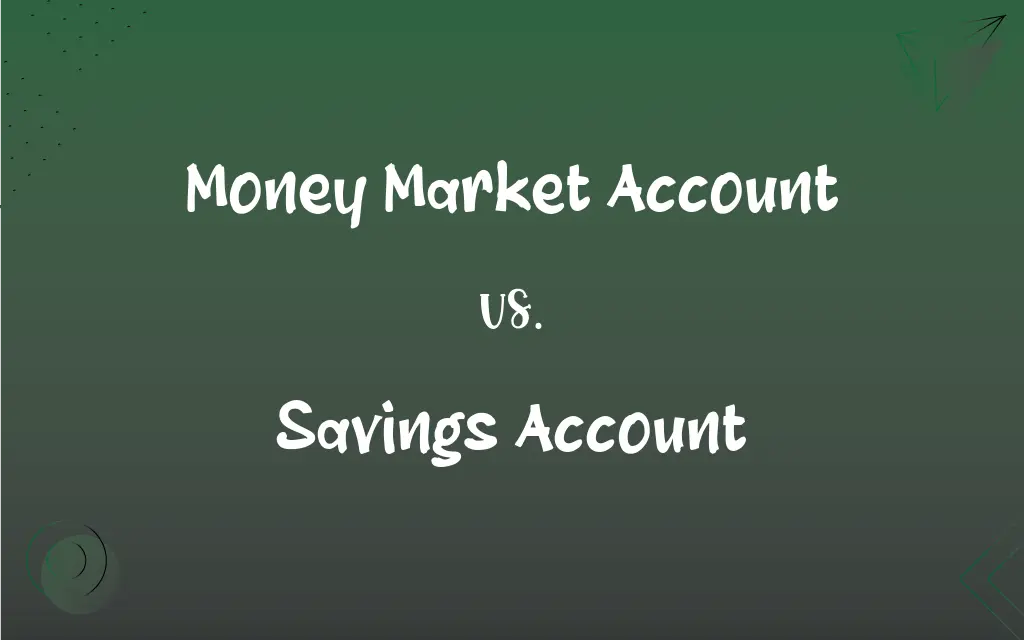Money Market Account vs. Savings Account: What's the Difference?
Edited by Aimie Carlson || By Janet White || Published on January 21, 2024
A money market account typically offers higher interest rates with check-writing options, whereas a savings account is a basic deposit account with lower interest but higher liquidity.

Key Differences
Money market accounts often have higher interest rates compared to savings accounts, reflecting their slightly higher risk and investment-oriented nature.
Savings accounts offer easy access and are designed for frequent deposits and withdrawals, whereas money market accounts may have restrictions on the number of transactions.
A money market account is a blend of savings and checking features, suitable for those seeking higher returns but with some liquidity. In contrast, a savings account is purely for saving money with stable, albeit lower, returns.
Both are low risk, money market accounts are slightly riskier due to their investment in short-term debt securities, unlike savings accounts which are straightforward deposit accounts.
Money market accounts typically require a higher minimum balance than savings accounts, reflecting their more investment-oriented nature.
ADVERTISEMENT
Comparison Chart
Interest Rates
Generally higher interest rates
Lower interest rates
Transaction Limitations
Limited transactions per month
More flexible with transactions
Check-Writing Ability
Often includes check-writing options
Typically no check-writing options
Minimum Balance Required
Higher minimum balance requirements
Lower or no minimum balance requirements
Investment Focus
Invests in short-term debt securities
Purely for saving, no investment component
ADVERTISEMENT
Money Market Account and Savings Account Definitions
Money Market Account
A money market account is a type of deposit account that pays interest based on current money market rates.
I transferred funds to my money market account to benefit from the higher interest rates.
Savings Account
Savings accounts typically have lower minimum balance requirements than other account types.
My savings account only requires a $100 minimum balance.
Money Market Account
Money market accounts are offered by banks and credit unions as higher-yield options.
The bank recommended a money market account for better returns on my savings.
Savings Account
A savings account is a deposit account held at a financial institution that provides modest interest.
I opened a savings account to set aside money for emergencies.
Money Market Account
They invest in short-term, liquid securities, offering slightly higher risk and return than savings accounts.
My money market account's interest rate fluctuates with the market.
Savings Account
It is primarily used for saving funds and offers easy access to money when needed.
I withdrew some cash from my savings account for unexpected expenses.
Money Market Account
It combines features of both savings and checking accounts, often including check-writing privileges.
My money market account allows me to write checks for larger purchases.
Savings Account
They are considered very low risk, with funds insured up to a certain amount by the government.
I feel secure knowing my savings account is federally insured.
Money Market Account
This account typically requires a higher minimum balance than a regular savings account.
I had to maintain a $5,000 minimum balance in my money market account.
Savings Account
This account type usually restricts the number of transactions per month.
I had to be mindful of the transaction limit on my savings account.
FAQs
Are money market accounts safe?
Yes, they're typically insured and considered safe, though slightly riskier than savings accounts.
What is a money market account?
It's a deposit account offering higher interest rates, often with check-writing options.
Is there a minimum balance requirement for savings accounts?
This varies by bank, but savings accounts usually have lower minimum balance requirements.
What’s the risk level of a money market account?
They're low risk, but slightly higher than savings accounts due to their investment strategies.
Can I withdraw money from a savings account anytime?
Generally, yes, but frequent withdrawals may be limited or incur fees.
Do money market accounts have higher interest rates than savings accounts?
Yes, they usually offer higher rates due to their investment nature.
Can I set up automatic transfers to a savings account?
Yes, most banks allow automatic transfers to savings accounts.
How does a savings account work?
A savings account is a basic deposit account at a bank, offering interest on your saved money with easy access.
Can I access my savings account online?
Yes, most banks offer online access to savings accounts.
Is a savings account suitable for long-term investments?
It's more suited for short-term savings due to lower interest rates.
Can I link my savings account to checking for overdraft protection?
Yes, many banks offer this feature.
What's the best use for a savings account?
It’s best for saving money over time and for easy access to funds.
Can I write checks from a money market account?
Many money market accounts allow limited check-writing.
Are savings accounts good for emergency funds?
Yes, they’re ideal for emergencies due to their liquidity and safety.
How do money market account yields compare to CDs?
They're generally lower than CDs but offer more liquidity.
Do money market accounts have monthly fees?
Some may, depending on the bank and account balance.
Is the interest rate on a money market account fixed?
No, it can fluctuate based on market conditions.
How often can I withdraw from my savings account?
Typically, you can withdraw several times a month without fees.
Are money market accounts insured?
Yes, they're usually insured up to a certain amount by government agencies.
What happens if I exceed transaction limits on a money market account?
You may face fees or account conversion.
About Author
Written by
Janet WhiteJanet White has been an esteemed writer and blogger for Difference Wiki. Holding a Master's degree in Science and Medical Journalism from the prestigious Boston University, she has consistently demonstrated her expertise and passion for her field. When she's not immersed in her work, Janet relishes her time exercising, delving into a good book, and cherishing moments with friends and family.
Edited by
Aimie CarlsonAimie Carlson, holding a master's degree in English literature, is a fervent English language enthusiast. She lends her writing talents to Difference Wiki, a prominent website that specializes in comparisons, offering readers insightful analyses that both captivate and inform.






































































